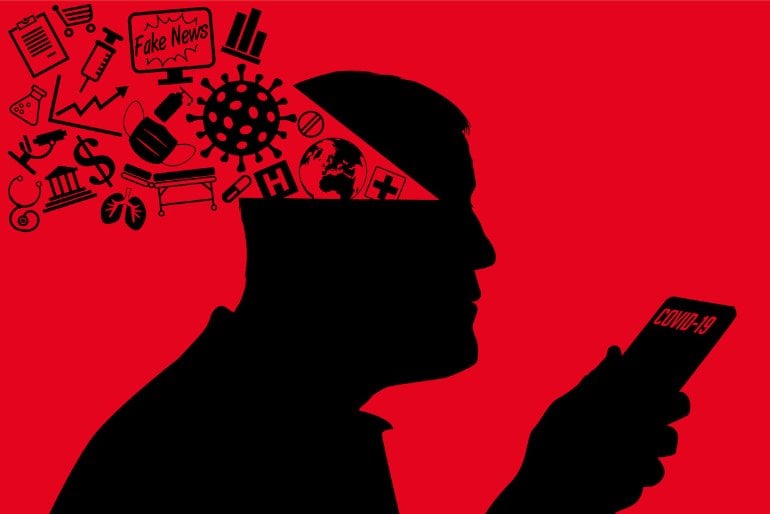Summary: Belief in conspiracy theories is causing problems within families and other close relationships. The growth of conspiratorial belief may be a result of social media outlets making it easier for those who believe in conspiracies to find other believers and share misinformation. Researchers say discussing your concerns for those close to you who believe in conspiracies requires a very careful approach.
Source: Virginia Commonwealth University
What does someone do when a friend or relative believes that a Satan-worshiping group within the federal government is running a child sex ring? Or that voting machines changed votes? Or that COVID-19 is a plot to put a microchip in someone’s body?
Conspiracy theories like these are common, and they are dividing more and more families. Children and parents are having a difficult time communicating because they have different understandings of basic facts. The problem is frustrating for everyone involved, but Caddie Alford, an assistant professor in the Department of English in the College of Humanities and Sciences at Virginia Commonwealth University, has some advice.
“We need to be generous in our approach to people who believe in conspiracy theories,” said Alford, Ph.D., who is writing a book on the power of belief.
The issue is not new. Conspiracy theories have always been a part of American discourse, said Chris Jackson, a pollster at Ipsos public affairs research. American thought has always gravitated to conspiracy theories, Jackson said. The challenge now is the pervasiveness of conspiracy theories, which can spread quickly through social media and YouTube. For example, the video “Plandemic,” which claims the COVID-19 virus was manufactured in a lab, was viewed millions of times within days after its release online.
“I don’t think people are more likely to believe a conspiracy theory now than they were 20 or 30 years ago,” Jackson said. “I think what has changed is information technology and social media has allowed these conspiracy theories to spread so much faster.”
Alford also posits that social media has allowed people to organize around particular ideas but says people do not have enough digital literacy to understand the algorithms behind the systems. Before social media, it might have been hard to find other people with shared beliefs around conspiracies, like those associated with the assassination of President John F. Kennedy. Now, entire Facebook groups can be devoted to a conspiracy theory and its members have a shared sense of belief.
The subject is important to Alford, whose forthcoming book is “Entitled Opinions: Reclaiming Doxa for the Digital Age.” She explored the Greek word doxa, which means “opinion” or “belief,” and she argues that the Greeks’ understanding of the word is relevant to the conversation about social media.
“This approach unearths rich feedback loops between opinion and social media,” Alford said.
However, talking with someone who has found community through social media and believes in conspiracy theories can be difficult. Alford believes a person cannot push too hard when talking about conspiracy theories because the friend or relative can become defensive. People have made huge connections to these beliefs and the community of people who believe the same thing.
Alford cites the example of Valerie Gilbert, a Harvard-educated writer who is a follower of the QAnon conspiracy theory. Gilbert writes about the theory on her Facebook page and communicates with many followers of QAnon. Alford believes it is not beliefs that attract people like Gilbert to QAnon and other conspiracy theories but the sense of community.
Gilbert’s sister was worried about her and tried to talk to her about her beliefs. After being confronted, Gilbert cut off all ties with her family. Her relationship to the QAnon community was important and something she valued.
“To Gilbert, that seemed condescending and outside the scope of their relationship,” Alford said. “It also just struck Gilbert as odd because she feels she is currently living her best, most enlightened life.”
The pandemic has only increased people’s isolation. Alford said communities have formed online, and the sense of community has become more important than the truth.
“Especially in such isolating times, we cannot discount the role that a sense of community and belonging is playing in the pull of conspiracy theories,” Alford said.

Alford suggests conversations around conspiracy theories should be aimed at understanding rather than arguing. She claims that with any belief, there is a kernel of truth. A person should ask probing questions and try to better understand the beliefs. People are likely to argue and become defensive when someone takes a position against their beliefs. They are more likely to answer a question where the aim is to understand.
“If the person you are talking to can only bring it back to identity, that should give you some insight into why they hold the beliefs they do,” Alford said.
Alford also suggests having a private conversation in person. People are likely to be defensive when challenged on a public social media platform.
“We have to appreciate the pull of our opinions and beliefs,” Alford said. “No one is immune from the persuasive elements of opinions. And opinions are not a lack of sense or a lack of knowledge. They form from real experiences and real desires.”
About this psychology research news
Source: Virginia Commonwealth University
Contact: James Shea – Virginia Commonwealth University
Image: The image is credited to VCU







